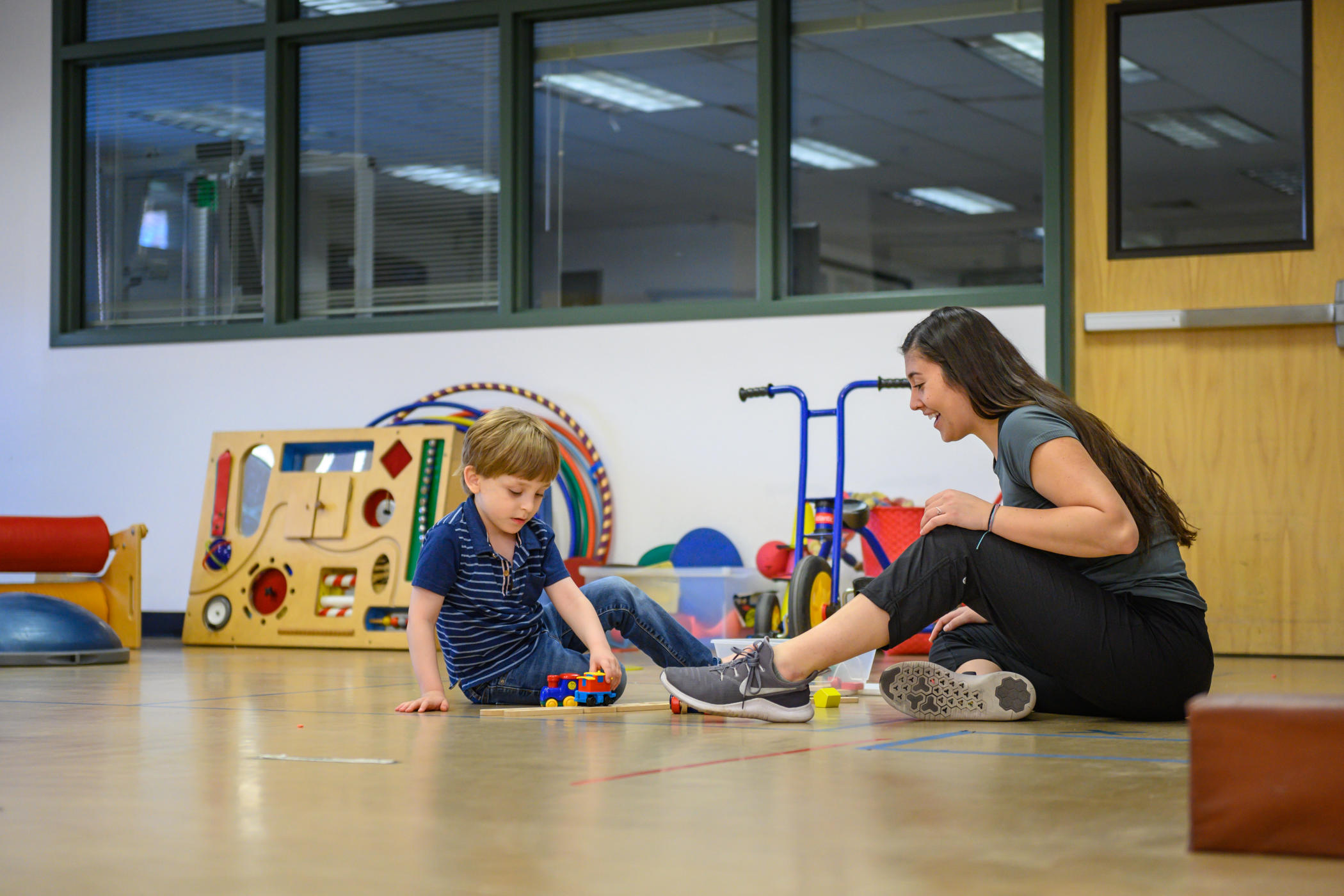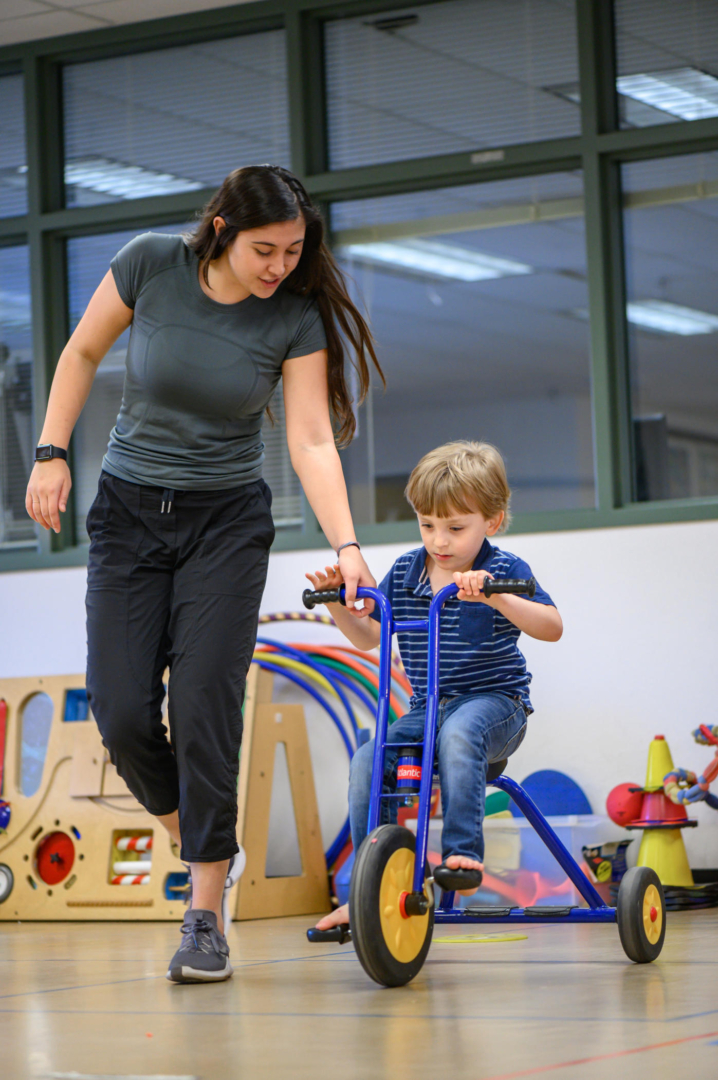Five Questions with Kinesiology Alumna and Adapted Physical Education Teacher Taylor Guy

Taylor Guy shows incredible ingenuity in finding new, creative, and thrifty ways to change the game, be it soccer or bowling, every day.
As an adapted physical education (APE) teacher at California School for the Blind (CSB), Guy (Kinesiology, ’18; MA, Kinesiology, ’20; Credential, ’21) ensures all her students, regardless of age or ability, can access and participate in sports and physical activities.
“Seeing my students succeed in areas that some people may not have perceived as possible for them, like playing basketball, that feeling is what I like,” she said. “This is what makes me feel fulfilled and I want to continue to do that with my career.”
Guy didn’t have this career plan in mind when she got to Chico State. It was an adapted physical education class at Chico State that piqued her interest, sparked her passion, and helped prepare her for a fulfilling career.
“I’m grateful for the experiences and knowledge that I have gained at Chico State,” she said. “As well as for all the people that supported me because I would not be in the position that I am in without that knowledge and support—it built my confidence.”
What she appreciates most about the adapted physical education program was the countless opportunities to practice and apply what she learned in the classroom. The classroom work and materials are important, but students also were given opportunities to work in the field in a way that wasn’t overly structured.
“I felt supported and encouraged to try new things and just keep growing from everyone in the department, especially Marci Pope and Josie Blagrave (clinic supervisor and kinesiology APE program coordinator),” Guy said. “I think that’s what makes the kinesiology department so great.”
Did you always know you wanted to get into Adapted Physical Education?
When I first enrolled at Chico, I knew I wanted to study kinesiology. I started as a movement studies major. Then I was encouraged to try Physical Education Teacher Education (PETE) and I liked it. Then, I took an intro (to adapted physical activity) class by (Professor) Marci Pope and something kind of just clicked. I enjoyed being creative and finding new ways to make sports and physical activities accessible. I loved all the service-learning programs we got to work with—BE:WEL, KIDS:PLAY—all fantastic programs. I remember on my last day in that class Marci said, “If you have questions about being an APE teacher, ask me at the end.” I almost didn’t ask about more classes, but I’m glad that I did because then I found what I wanted to do in my life.
What impact do you want to make on your students?
My goal as an APE teacher is to introduce my students to many different physical activities and sports so that they can find something they enjoy and be physically active for life. So, if they get interested in a blind sport—one of the blinds sports we coach and one that is popular is goalball—I do what I can for them to find a community resource or if they’re skilled, connect them with high-level coaches so they can pursue it further, like at the Paralympics. If they enjoy hiking or yoga, I try to give them enough confidence and skills so they can join a yoga class or go to a fitness class. Just helping my students find something for them, whether it be a team sport or an individual sport, that they can do for a lifetime.

What classes or activities were you involved in at Chico State?
I was a clinician at the Chico State Autism Clinic—it’s a hidden gem on campus. I love the clinic. I learned a lot from Josie Blagrave and Carli Ross (kinesiology lecturer and clinician). I learned different teaching techniques, but they also gave me the space to figure it out for myself. I got to be creative and find my own style of teaching while also learning from other great teachers. Also, at BE:WEL I worked with adults with disabilities in a more fitness-oriented setting. I gained a lot of experience from that. And there was the other BE:WEL program, where students from the surrounding middle and high schools would come to campus and we would put on different activities. I gained a lot of leadership skills through that hands-on learning.
During grad school, I taught one semester of KIDS:PLAY, a program where individuals with disabilities in the community would come to Chico Sports Club and participate in different physical activities run by Chico State students. Some of the activities would include fitness, swimming, and sports.
Have you applied what you learned at Chico State to your current role?
Absolutely, I would say I’ve used something from all my classes. One of my favorite classes was our assessment class. So, there are standardized assessments that we use in our profession to assess our students to determine IEP goals and what areas of gross motor they need to work on. I use some of those assessments almost weekly, and the same ones that I learned at Chico State. And then a lot of the adaptations that I learned are cool tricks. One we used just recently. We were teaching soccer to our students and working on dribbling, and our soccer balls have bells in them so our students can hear them, but that doesn’t mean every student can maintain control. So, we took stockings and stuffed the ball to the bottom, so the student can hold on to the stocking and dribble the ball and keep it with them. They can practice the technique and get the feel while still being independent.
I learned how to make cool stuff with PVC pipes and stockings. It was a lot of learning how to take everyday items and have them turned into equipment because the equipment can be expensive.
What does Chico State offers that you think can’t be found elsewhere?
The word that keeps coming to mind is community. There is a sense of community not just within the school, but the surrounding areas and collaborating with other programs. That’s what I felt the most in my program—I never felt isolated to just the campus. Everything that I learned and that we did somehow touched the community. And the community let us as students come and learn and practice our skills.


